哲学的历史发展【英文】
- 格式:ppt
- 大小:619.50 KB
- 文档页数:50
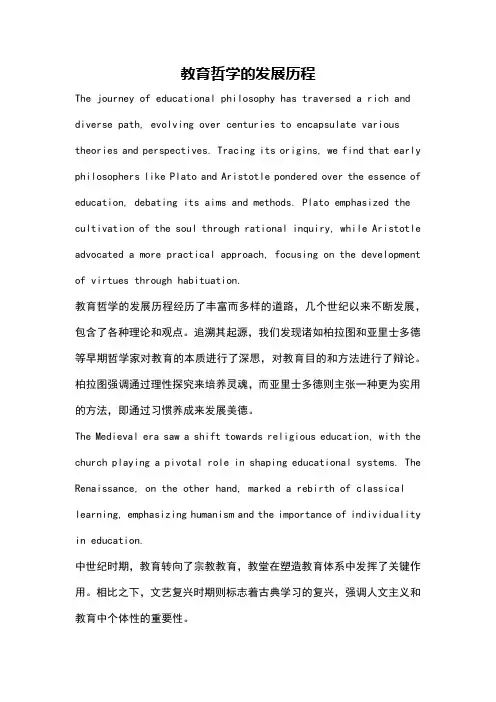
教育哲学的发展历程The journey of educational philosophy has traversed a rich and diverse path, evolving over centuries to encapsulate various theories and perspectives. Tracing its origins, we find that early philosophers like Plato and Aristotle pondered over the essence of education, debating its aims and methods. Plato emphasized the cultivation of the soul through rational inquiry, while Aristotle advocated a more practical approach, focusing on the development of virtues through habituation.教育哲学的发展历程经历了丰富而多样的道路,几个世纪以来不断发展,包含了各种理论和观点。
追溯其起源,我们发现诸如柏拉图和亚里士多德等早期哲学家对教育的本质进行了深思,对教育目的和方法进行了辩论。
柏拉图强调通过理性探究来培养灵魂,而亚里士多德则主张一种更为实用的方法,即通过习惯养成来发展美德。
The Medieval era saw a shift towards religious education, with the church playing a pivotal role in shaping educational systems. The Renaissance, on the other hand, marked a rebirth of classical learning, emphasizing humanism and the importance of individuality in education.中世纪时期,教育转向了宗教教育,教堂在塑造教育体系中发挥了关键作用。
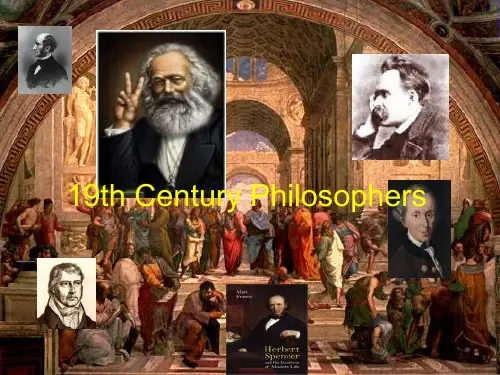

西方哲学的发展历程
西方哲学的发展历程可以追溯到古希腊时期。
在这个时期,一些重要的哲学家如亚里士多德、柏拉图和苏格拉底开始思考关于人类存在、真理和道德的问题。
亚里士多德强调通过观察和推理来获得知识,并提出了逻辑学的基本原则。
柏拉图则着重思考理念和观念的本质,并认为真理存在于超越个体的普遍理念中。
苏格拉底则将注意力集中于伦理学,通过对话的形式引导人们反思自己的行为和价值观。
这些古希腊哲学家的思想直接或间接地影响了后世哲学家的思考。
在古罗马时期,斯多噶派学派的哲学家如塞内卡等将古希腊哲学进一步发展和传播。
而基督教的兴起则给哲学思考带来了新的方向。
中世纪的哲学家圣奥古斯丁和托马斯·阿奎纳斯提出了基督教哲学的观点,将信仰与理性相结合。
文艺复兴时期,人文主义思想逐渐兴起,启蒙运动带来了理性主义和经验主义的争论。
笛卡尔提出了“我思故我在”的理性主义观点,而洛克则强调通过感觉和经验来获取知识。
18世纪,以康德为代表的德国哲学家提出了“启蒙”的理念,主张人们应该依靠自己的理性来解决问题。
19世纪,黑格尔的唯心主义和尼采的超人观念改变了人们对于真理和人类存在的看法。
20世纪,在逻辑实证主义和存在主义的影响下,哲学注重语言分析和人类存在的问题。
维特根斯坦和罗素等逻辑实证主义
者强调语言的清晰和逻辑性。
而存在主义者如海德格尔和萨特则关注人类存在的意义和自由的问题。
当代哲学则呈现出多样性和多元化的局面。
从后现代思潮到分析哲学,从女性主义哲学到环境伦理学,各种各样的思想流派使得西方哲学在不同的领域和问题上得到了深入的探讨。
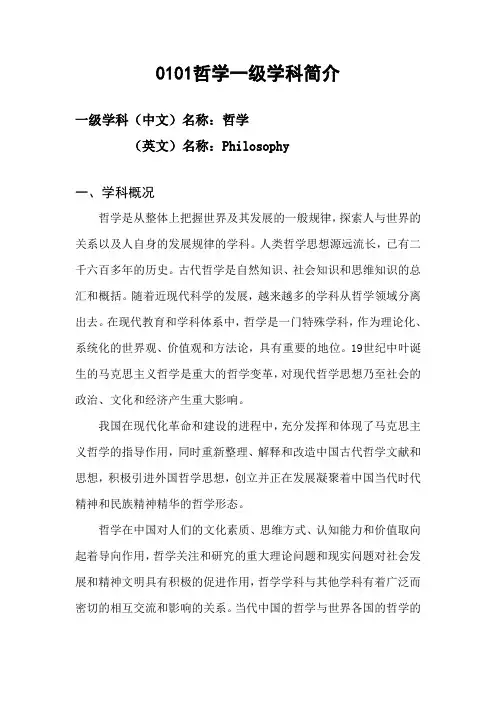
0101哲学一级学科简介一级学科(中文)名称:哲学(英文)名称:Philosophy一、学科概况哲学是从整体上把握世界及其发展的一般规律,探索人与世界的关系以及人自身的发展规律的学科。
人类哲学思想源远流长,已有二千六百多年的历史。
古代哲学是自然知识、社会知识和思维知识的总汇和概括。
随着近现代科学的发展,越来越多的学科从哲学领域分离出去。
在现代教育和学科体系中,哲学是一门特殊学科,作为理论化、系统化的世界观、价值观和方法论,具有重要的地位。
19世纪中叶诞生的马克思主义哲学是重大的哲学变革,对现代哲学思想乃至社会的政治、文化和经济产生重大影响。
我国在现代化革命和建设的进程中,充分发挥和体现了马克思主义哲学的指导作用,同时重新整理、解释和改造中国古代哲学文献和思想,积极引进外国哲学思想,创立并正在发展凝聚着中国当代时代精神和民族精神精华的哲学形态。
哲学在中国对人们的文化素质、思维方式、认知能力和价值取向起着导向作用,哲学关注和研究的重大理论问题和现实问题对社会发展和精神文明具有积极的促进作用,哲学学科与其他学科有着广泛而密切的相互交流和影响的关系。
当代中国的哲学与世界各国的哲学的交流日益频繁和深入,成为促进中外文化交流、增进相互理解的重要思想媒介和精神纽带。
二、学科内涵在长期历史发展中,哲学内部逐渐形成了一系列相对独立而又彼此有机联系着的分支学科。
其中主要有:包括本体论、认识论、社会历史观、方法论和价值论等在内的基本理论,以及关于哲学产生、发展过程和人类认识规律的哲学史。
随着社会、文化和科学的发展,哲学在不同时代所关注的对象、理论形态和研究方法都经历着不同的变化。
现代哲学的重要特征是与自然科学、社会科学、人文学科和新兴学科日益渗透、贯通,由此形成了一系列新的哲学分支学科和交叉学科,它们不但影响着相关学科的理论范式和方法论基础,而且也影响着哲学自身的理论形态和知识结构。
这些分支学科相互影响和渗透,包含着复杂的内容,存在着进一步分化和综合的可能。
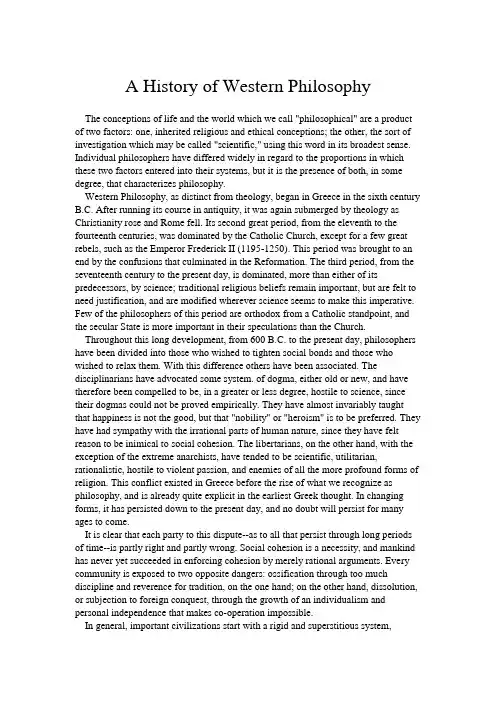
A History of Western PhilosophyThe conceptions of life and the world which we call "philosophical" are a product of two factors: one, inherited religious and ethical conceptions; the other, the sort of investigation which may be called "scientific," using this word in its broadest sense. Individual philosophers have differed widely in regard to the proportions in which these two factors entered into their systems, but it is the presence of both, in some degree, that characterizes philosophy.Western Philosophy, as distinct from theology, began in Greece in the sixth century B.C. After running its course in antiquity, it was again submerged by theology as Christianity rose and Rome fell. Its second great period, from the eleventh to the fourteenth centuries, was dominated by the Catholic Church, except for a few great rebels, such as the Emperor Frederick II (1195-1250). This period was brought to an end by the confusions that culminated in the Reformation. The third period, from the seventeenth century to the present day, is dominated, more than either of its predecessors, by science; traditional religious beliefs remain important, but are felt to need justification, and are modified wherever science seems to make this imperative. Few of the philosophers of this period are orthodox from a Catholic standpoint, and the secular State is more important in their speculations than the Church. Throughout this long development, from 600 B.C. to the present day, philosophers have been divided into those who wished to tighten social bonds and those who wished to relax them. With this difference others have been associated. The disciplinarians have advocated some system. of dogma, either old or new, and have therefore been compelled to be, in a greater or less degree, hostile to science, since their dogmas could not be proved empirically. They have almost invariably taught that happiness is not the good, but that "nobility" or "heroism" is to be preferred. They have had sympathy with the irrational parts of human nature, since they have felt reason to be inimical to social cohesion. The libertarians, on the other hand, with the exception of the extreme anarchists, have tended to be scientific, utilitarian, rationalistic, hostile to violent passion, and enemies of all the more profound forms of religion. This conflict existed in Greece before the rise of what we recognize as philosophy, and is already quite explicit in the earliest Greek thought. In changing forms, it has persisted down to the present day, and no doubt will persist for many ages to come.It is clear that each party to this dispute--as to all that persist through long periods of time--is partly right and partly wrong. Social cohesion is a necessity, and mankind has never yet succeeded in enforcing cohesion by merely rational arguments. Every community is exposed to two opposite dangers: ossification through too much discipline and reverence for tradition, on the one hand; on the other hand, dissolution, or subjection to foreign conquest, through the growth of an individualism and personal independence that makes co-operation impossible.In general, important civilizations start with a rigid and superstitious system,gradually relaxed, and leading, at a certain stage, to a period of brilliant genius, while the good of the old tradition remains and the evil inherent in its dissolution has not yet developed. But as the evil unfolds, it leads to anarchy, thence, inevitably, to a new tyranny, producing a new synthesis secured by a new system of dogma. The doctrine of liberalism is an attempt to escape from this endless oscillation. The essence of liberalism is an attempt to secure a social order not based on irrational dogma, and insuring stability without involving more restraints than are necessary for the preservation of the community. Whether this attempt can succeed or not is only determine by the future..。
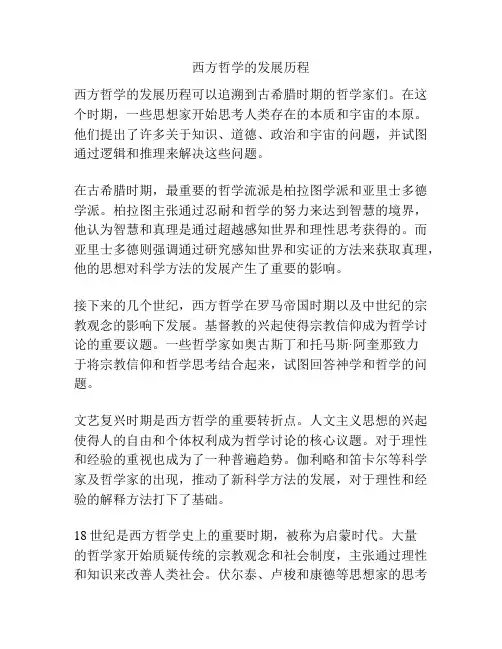
西方哲学的发展历程西方哲学的发展历程可以追溯到古希腊时期的哲学家们。
在这个时期,一些思想家开始思考人类存在的本质和宇宙的本原。
他们提出了许多关于知识、道德、政治和宇宙的问题,并试图通过逻辑和推理来解决这些问题。
在古希腊时期,最重要的哲学流派是柏拉图学派和亚里士多德学派。
柏拉图主张通过忍耐和哲学的努力来达到智慧的境界,他认为智慧和真理是通过超越感知世界和理性思考获得的。
而亚里士多德则强调通过研究感知世界和实证的方法来获取真理,他的思想对科学方法的发展产生了重要的影响。
接下来的几个世纪,西方哲学在罗马帝国时期以及中世纪的宗教观念的影响下发展。
基督教的兴起使得宗教信仰成为哲学讨论的重要议题。
一些哲学家如奥古斯丁和托马斯·阿奎那致力于将宗教信仰和哲学思考结合起来,试图回答神学和哲学的问题。
文艺复兴时期是西方哲学的重要转折点。
人文主义思想的兴起使得人的自由和个体权利成为哲学讨论的核心议题。
对于理性和经验的重视也成为了一种普遍趋势。
伽利略和笛卡尔等科学家及哲学家的出现,推动了新科学方法的发展,对于理性和经验的解释方法打下了基础。
18世纪是西方哲学史上的重要时期,被称为启蒙时代。
大量的哲学家开始质疑传统的宗教观念和社会制度,主张通过理性和知识来改善人类社会。
伏尔泰、卢梭和康德等思想家的思考拓宽了哲学的领域,涉及到伦理、政治、社会和法律等方面。
到了19世纪,新的思潮和思想流派不断涌现。
马克思主义的出现推动了社会主义和共产主义的思想发展,对于政治、经济和社会的研究产生了重要的影响。
同时,尼采和存在主义的兴起使得对于人类存在和自由意志的思考成为了重要的议题。
20世纪的西方哲学发展如火如荼,包括逻辑学、分析哲学、实证主义、后现代主义等不同的思潮。
逻辑学家如罗素和维特根斯坦开创了逻辑实证主义的学派,试图通过逻辑和语言分析来解决哲学问题。
然而,这一思潮在20世纪中叶逐渐被批判,并在后现代主义思潮的影响下出现了新的哲学思考方法。
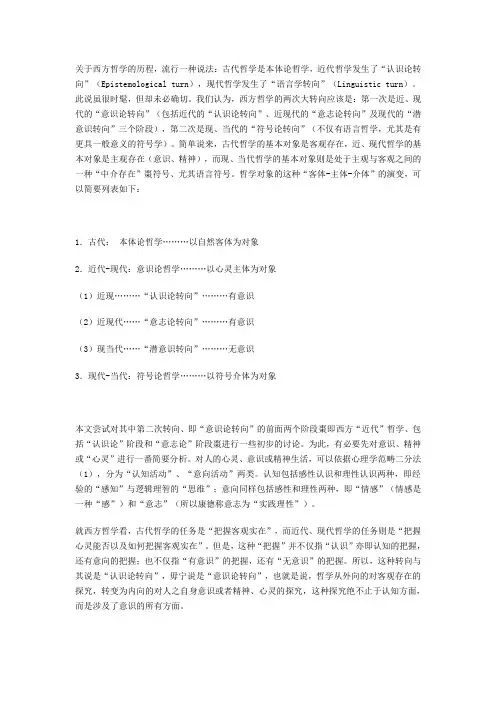
关于西方哲学的历程,流行一种说法:古代哲学是本体论哲学,近代哲学发生了“认识论转向”(Epistemological turn),现代哲学发生了“语言学转向”(Linguistic turn)。
此说虽很时髦,但却未必确切。
我们认为,西方哲学的两次大转向应该是:第一次是近、现代的“意识论转向”(包括近代的“认识论转向”、近现代的“意志论转向”及现代的“潜意识转向”三个阶段),第二次是现、当代的“符号论转向”(不仅有语言哲学,尤其是有更具一般意义的符号学)。
简单说来,古代哲学的基本对象是客观存在,近、现代哲学的基本对象是主观存在(意识、精神),而现、当代哲学的基本对象则是处于主观与客观之间的一种“中介存在”棗符号、尤其语言符号。
哲学对象的这种“客体-主体-介体”的演变,可以简要列表如下:1.古代:本体论哲学………以自然客体为对象2.近代-现代:意识论哲学………以心灵主体为对象(1)近现………“认识论转向”………有意识(2)近现代……“意志论转向”………有意识(3)现当代……“潜意识转向”………无意识3.现代-当代:符号论哲学………以符号介体为对象本文尝试对其中第二次转向、即“意识论转向”的前面两个阶段棗即西方“近代”哲学、包括“认识论”阶段和“意志论”阶段棗进行一些初步的讨论。
为此,有必要先对意识、精神或“心灵”进行一番简要分析。
对人的心灵、意识或精神生活,可以依据心理学范畴二分法(1),分为“认知活动”、“意向活动”两类。
认知包括感性认识和理性认识两种,即经验的“感知”与逻辑理智的“思维”;意向同样包括感性和理性两种,即“情感”(情感是一种“感”)和“意志”(所以康德称意志为“实践理性”)。
就西方哲学看,古代哲学的任务是“把握客观实在”,而近代、现代哲学的任务则是“把握心灵能否以及如何把握客观实在”。
但是,这种“把握”并不仅指“认识”亦即认知的把握,还有意向的把握;也不仅指“有意识”的把握,还有“无意识”的把握。

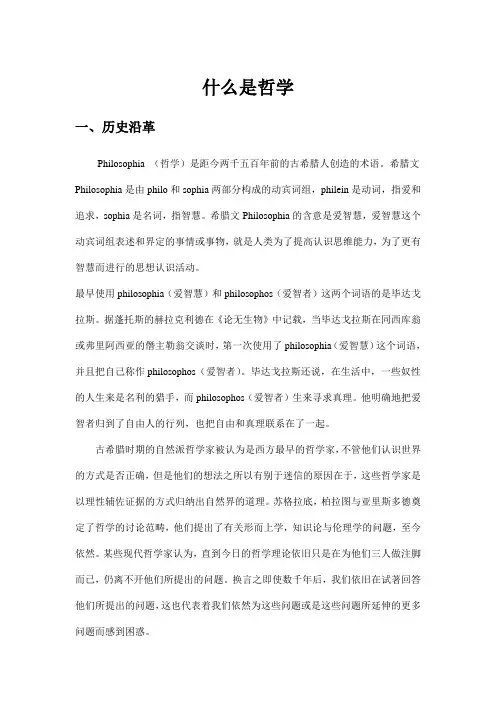
什么是哲学一、历史沿革Philosophia (哲学)是距今两千五百年前的古希腊人创造的术语。
希腊文Philosophia是由philo和sophia两部分构成的动宾词组,philein是动词,指爱和追求,sophia是名词,指智慧。
希腊文Philosophia的含意是爱智慧,爱智慧这个动宾词组表述和界定的事情或事物,就是人类为了提高认识思维能力,为了更有智慧而进行的思想认识活动。
最早使用philosophia(爱智慧)和philosophos(爱智者)这两个词语的是毕达戈拉斯。
据蓬托斯的赫拉克利德在《论无生物》中记载,当毕达戈拉斯在同西库翁或弗里阿西亚的僭主勒翁交谈时,第一次使用了philosophia(爱智慧)这个词语,并且把自己称作philosophos(爱智者)。
毕达戈拉斯还说,在生活中,一些奴性的人生来是名利的猎手,而philosophos(爱智者)生来寻求真理。
他明确地把爱智者归到了自由人的行列,也把自由和真理联系在了一起。
古希腊时期的自然派哲学家被认为是西方最早的哲学家,不管他们认识世界的方式是否正确,但是他们的想法之所以有别于迷信的原因在于,这些哲学家是以理性辅佐证据的方式归纳出自然界的道理。
苏格拉底,柏拉图与亚里斯多德奠定了哲学的讨论范畴,他们提出了有关形而上学,知识论与伦理学的问题,至今依然。
某些现代哲学家认为,直到今日的哲学理论依旧只是在为他们三人做注脚而已,仍离不开他们所提出的问题。
换言之即使数千年后,我们依旧在试著回答他们所提出的问题,这也代表着我们依然为这些问题或是这些问题所延伸的更多问题而感到困惑。
“哲”一词在中国起源很早,历史久远。
如“孔门十哲”,“古圣先哲”等词,“哲”或“哲人”,专指那些善于思辨,学问精深者,即西方近似“哲学家”,“思想家”之谓。
一般认为中国哲学起源东周时期,以孔子的儒家、老子的道家、墨子的墨家及晚期的法家为代表。
而实际上在之前的《易经》当中,已经开始讨论哲学问题。
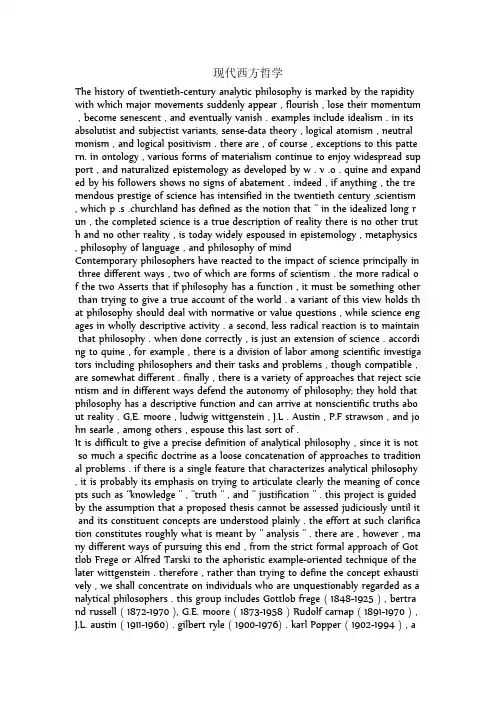
现代西方哲学The history of twentieth-century analytic philosophy is marked by the rapidity with which major movements suddenly appear , flourish , lose their momentum , become senescent , and eventually vanish . examples include idealism . in its absolutist and subjectist variants, sense-data theory , logical atomism , neutral monism , and logical positivism . there are , of course , exceptions to this patte rn. in ontology , various forms of materialism continue to enjoy widespread sup port , and naturalized epistemology as developed by w . v .o . quine and expand ed by his followers shows no signs of abatement . indeed , if anything , the tre mendous prestige of science has intensified in the twentieth century ,scientism , which p .s .churchland has defined as the notion that " in the idealized long r un , the completed science is a true description of reality there is no other trut h and no other reality , is today widely espoused in epistemology , metaphysics , philosophy of language , and philosophy of mindContemporary philosophers have reacted to the impact of science principally in three different ways , two of which are forms of scientism . the more radical o f the two Asserts that if philosophy has a function , it must be something other than trying to give a true account of the world . a variant of this view holds th at philosophy should deal with normative or value questions , while science eng ages in wholly descriptive activity . a second, less radical reaction is to maintain that philosophy . when done correctly , is just an extension of science . accordi ng to quine , for example , there is a division of labor among scientific investiga tors including philosophers and their tasks and problems , though compatible , are somewhat different . finally , there is a variety of approaches that reject scie ntism and in different ways defend the autonomy of philosophy; they hold that philosophy has a descriptive function and can arrive at nonscientific truths abo ut reality . G,E. moore , ludwig wittgenstein , J.L . Austin , P.F strawson , and jo hn searle , among others , espouse this last sort of .It is difficult to give a precise definition of analytical philosophy , since it is not so much a specific doctrine as a loose concatenation of approaches to tradition al problems . if there is a single feature that characterizes analytical philosophy , it is probably its emphasis on trying to articulate clearly the meaning of conce pts such as “knowledge " , "truth " , and " justification " . this project is guided by the assumption that a proposed thesis cannot be assessed judiciously until it and its constituent concepts are understood plainly . the effort at such clarifica tion constitutes roughly what is meant by " analysis " . there are , however , ma ny different ways of pursuing this end , from the strict formal approach of Got tlob Frege or Alfred Tarski to the aphoristic example-oriented technique of the later wittgenstein . therefore , rather than trying to define the concept exhausti vely , we shall concentrate on individuals who are unquestionably regarded as a nalytical philosophers . this group includes Gottlob frege ( 1848-1925 ) , bertra nd russell ( 1872-1970 ), G.E. moore ( 1873-1958 ) Rudolf carnap ( 1891-1970 ) , J.L. austin ( 1911-1960) . gilbert ryle ( 1900-1976) . karl Popper ( 1902-1994 ) , and W.V.O . quine ( 1908 -) . nearly all of the major achievements in this field a re due to these people . many of them have transformedolder traditions in new ways ( as we will see with quines holistic empiricism ) , but some ( especially wittgenstein and austin ) have developed new and uniqu e approaches to philosophical questions . without a doubt , the most influential philosopher of the era has been wittgenstein (1889-1951)his writingnearly all of them published only after his death--dominate the contemporary s cene and seem destined to remain of central importance in the foreseeable futu re . a fruitful way surveying the period is thus to concentrate ( chronologically ) upon the contributions of this distinguished group of individualsThe creation of symbolic ( or mathematical ) logic is perhaps the single most s ignificant development in the century . apart from its intrinsic interest and tech nical sophistication , it has exercised an enormous influence on philosophy per se . though there are anticipations of this kind of logic among the stoics , its m odern forms without exact parallel in western thought . it quickly became appa rent achievement of this order could not easily be ignored , and no matter how diverse their concerns nearly all analytical philosopher acknowledge the importance ofmathematical . this was especially true when the new logic , with its close affinities to mathematics , was recognized as fundamental to scientific theorizin g . the combination of logic and science was regarded by many philosophers as a model that philosophical inquiry should follow . logical positivism-a doctrine that flourished in the 1930s and 1940s--was an egregious expression of this poi nt of viewBut logic itself , apart from its scientific affiliations . served as a role model . many philosophers felt that its criteria of clarity , precision , and rigor should be the desired ideals in grappling with philosophical issues . yet other thinkers , especially the later Wittgenstein , rejected this approach , arguing that treating logic as an ideal language , superior to natural languages such as english or german , led to paradox and coherence . wittgenstein's later philosophy consisted in developing a unique method that emphasized the merit of ordinary language in describing the world . in particular his method avoided the kind of theorizing and generalization essential to logic . since the new logic initiated such powerful and diverse reactions , we shall begin with a brief account of its central tenets . on this basis , we can describe why these philosophers responded to it in their different ways二十世纪分析哲学的历史是通过与主要的动作突然出现,蓬勃发展,失去了自己的气势,变得衰老,并最终消失在迅速显着。
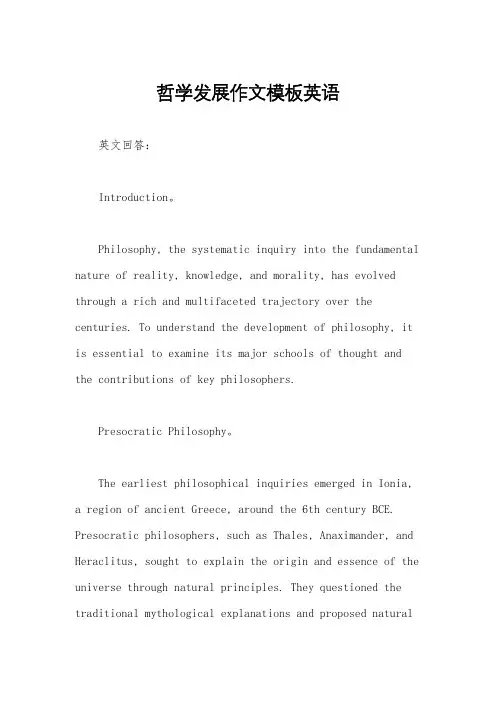
哲学发展作文模板英语英文回答:Introduction。
Philosophy, the systematic inquiry into the fundamental nature of reality, knowledge, and morality, has evolved through a rich and multifaceted trajectory over the centuries. To understand the development of philosophy, it is essential to examine its major schools of thought and the contributions of key philosophers.Presocratic Philosophy。
The earliest philosophical inquiries emerged in Ionia, a region of ancient Greece, around the 6th century BCE. Presocratic philosophers, such as Thales, Anaximander, and Heraclitus, sought to explain the origin and essence of the universe through natural principles. They questioned the traditional mythological explanations and proposed naturalelements (e.g., water, air) as the foundational constituents of all things.Socratic Philosophy。
In the 4th century BCE, Socrates revolutionized philosophy by emphasizing the importance of critical thinking and self-examination. Known for his Socratic method, he would lead conversations with his students, questioning their beliefs and assumptions until they reached a clearer understanding. Socrates's interrogation technique, which became known as dialectic, was instrumental in the development of logical reasoning.Platonic Philosophy。
哲学发展作文英语模板英文回答:Philosophy has been an integral part of human civilization for millennia, constantly evolving and expanding our understanding of the world around us. The development of philosophy can be traced through distinct historical periods, each characterized by its unique set of philosophical schools and ideas.Ancient Philosophy (6th Century BCE 3rd Century CE)。
Pre-Socratic philosophers: Thales, Anaximander, Anaximenes, Pythagoras。
Focus on the nature of reality and the origins of the universe。
Emphasis on rational inquiry and natural explanation。
Classical Greek Philosophy (5th 4th Century BCE)。
Socrates: Known for the Socratic method of questioning and emphasis on self-knowledge。
Plato: Developed the theory of Forms, which posits the existence of a realm of perfect and unchanging ideas。
Aristotle: A prolific philosopher who wrote extensively on logic, ethics, metaphysics, and politics。
古希腊时期:公元前七世纪——公元前二世纪Ancient Greece: the seventh century B.C. -- the second century B.C.古希腊哲学的发展可以明确地分为三个阶段:自然哲学时期、人本主义和系统哲学时期、希腊化和罗马哲学时期。
The development of ancient Greek philosophy can be clearly divided into three stages: natural philosophy, humanism and system philosophy, Hellenization and Roman period.古希腊哲学的整个学说体系以“实体原理”为核心展开,具体包括物质本原说、自然类观念、形成论和还原原理,它们构成了严整的逻辑关系。
the ancient Greek philosophy of the whole theory system with principle of "entity" as the core, including material origin conception, nature, formation theory and principle of reduction, they constitute a rigorous logic relationship.1.自然哲学时期1. Natural philosophy公元前6世纪,东方伊奥尼亚地方的一些哲学家开始提出世界的本原问题,The 6th century BC, the east of ionia place some philosophers began to put forward the roots of the problem,他们反对过去流传的种种神话创世说,认为世界的本原是一些物质性的元素,如水、气、火等;they are againstthe spread of a variety of myths creationism, think the origins of the world are some material elements, such as water, air, fire, etc.他们最早用自然本身来解释世界的生成,是西方最早的唯物主义哲学家。
古希腊哲学古希腊哲学(Graeco philosophy):公元前6-公元5世纪出现在希腊本土以及地中海沿岸,特别是小亚细亚西部、意大利南部的哲学学说。
又称古希腊罗马哲学,是西方哲学最初发生和发展的阶段。
古典希腊哲学,或称早期希腊哲学集中在辩论与质询的任务。
在很多方面,它同时为现代科学与现代哲学铺设了道路。
早期希腊哲学家对后世产生的影响从未间断,从早期穆斯林哲学到文艺复兴,再到启蒙运动和现代的普通科学。
中文名:古希腊哲学外文名:Graeco philosophy出现时间:公元前6~公元5世纪出现地点:希腊本土以及地中海沿岸。
后世影响:古典希腊哲学的影响在很多方面为现代科学与现代哲学铺设了道路。
在宗教方面,古典希腊哲学对早期不同宗教的希腊化发展都具有深远的影响。
例如,犹太教的希腊化,著名犹太哲学家:亚里斯多布鲁斯(Aristobulus)和斐洛,便采用了寓意的解经方法。
而在基督宗教当中,早期的教会父老(即教父)都融合了古希腊哲学的思想和解经方法。
由于受著名的教父游斯丁、俄利根和特土良等所影响,形成了很多基督教传统教义。
早期希腊哲学家对后世所产生的影响从未间断,从早期基督教神学、穆斯林哲学到文艺复兴,再到启蒙运动和现代的普通科学都可见得到。
历史地位:在西方哲学的发展史中,古希腊哲学是它的幼年时期。
最初的希腊哲学家同时也是自然科学家,他们不满足于原始宗教和神话,根据自己的直观,以人类正常的常识为依据,用自然现象本身来说明世界;他们从无限多样的自然现象中看到它们的统一和联系,看到它们的不断变化和发展,看到它们的矛盾和对立。
因此,最初的希腊哲学家都具有自发的朴素唯物主义或朴素的辩证法思想。
最初的唯心主义哲学是在阶级偏见、宗教影响和认识的片面性中发生发展起来的。
即使是唯心主义的哲学家,他们也将世界当作一个整体而从总的方面来观察。
马克思说希腊人是“正常的儿童”,他们受到的歪曲比较少,因此能够向我们提供比较正确的、虽然是幼稚的世界观。